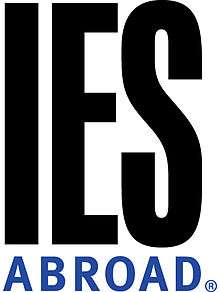Institute for the International Education of Students
 | |
| Founded | 1950[1] |
|---|---|
| Founder | Paul Koutny, Clarence Giese, Alberta Giese |
| Type |
Not-for-profit (IRS exemption status): 501(c)(3)) |
| Focus | Education, Study Abroad, Intercultural leadership |
| Location |
|
Area served | Global |
Key people |
Dr. Mary Dwyer President & CEO |
Employees | 250+ |
| Website | www.IESabroad.org |
Formerly called | The Institute of European Studies |
| Member of NAFSA, Forum on education abroad, and Diversity Abroad | |
The Institute for the International Education of Students, or IES Abroad, is a non-profit study abroad organization that administers study abroad programs for U.S. college-aged students.[2] Founded in 1950 as the Institute of European Studies, the organization has since been renamed to reflect additional offerings in Africa, Asia, Oceania, and Latin America. The organization now provides more than 120 programs in 30+ cities. Over 80,000 students have studied abroad on IES Abroad programs since its founding, with more than 5,700 students studying abroad each year.[1]
IES Abroad has an Academic Consortium composed of over 200 academic institutions.[3] It offers over $3 million in scholarships to help finance qualified students abroad.[4] In accordance with its mission and vision statement, IES Abroad highlights cultural immersion through the use of homestays and field trips to “[promote] the development of interculturally-competent leaders.”[5] IES Abroad’s services include pre-departure advising, visa assistance, alumni mentors, and safety plans at Centers abroad.[6] IES Abroad has a diversity initiative[2][7] and a green initiative.[8]
History
IES Abroad offered its first program in September 1950, when Paul Koutny, an Austrian student living in the U.S. on a Fulbright scholarship, brought American students to live and study in Vienna, Austria for a year.[9] Two of the students from the original program, newlyweds Clarence and Alberta Giese, returned after the program inspired to help other students study abroad. From their Chicago home, they worked with Koutny to recruit more students and send them abroad.[10]
IES Abroad developed a Model Assessment Practice [11] in 1999 as a framework for the design, development, and evaluation of programs of study abroad. This program formed the basis for the standards of the Forum on Education Abroad adopted by the field.[12] In 2010, IES Abroad was the first third-party provider to receive the Forum on Education Abroad’s Category 2b Quality Improvement Designation, which involves independent reviewers using evaluation systems to make program improvements. [13]
Notable Alumni
- Donald Hopkins
- John Irving
- Michael Isikoff
- Charles E. Merrill, Jr.
- David Muir
- Janet Napolitano
- Sonia Nazario
- Mark Shriver
- Daniel Quinn
See also
- NAFSA: Association of International Educators
- Institute of International Education
- Forum on education abroad
- Study abroad in the United States
- Study abroad organization
References
- 1 2 "About Us | IES Abroad | Study Abroad". IES Abroad. Retrieved 2013-10-04.
- 1 2 Hu, Helen (12 April 2012). "Educators discuss strategies to diversify pool of study-abroad students". Diverse Issues in Higher Education – via HighBeam Research (subscription required) . Retrieved 6 August 2013.
- ↑ Twombly, Susan; Salisbury, Mark; Turmanut, Shannon (2012). Study Abroad in a New Global Century. Wiley. p. 34.
- ↑ "Scholarships | IES Abroad | Study Abroad". IES Abroad. Retrieved 2013-10-04.
- ↑ "Mission & Vision | IES Abroad | Study Abroad". IES Abroad. Retrieved 2013-10-04.
- ↑ "Safety | IES Abroad".
- ↑ "Diversity Abroad | IES Abroad | Study Abroad". IES Abroad. Retrieved 2013-10-04.
- ↑ "Go Green Initiative | IES Abroad | Study Abroad". IES Abroad. Retrieved 2013-10-04.
- ↑ "History | IES Abroad".
- ↑ Salts, Josh (20 Jan 2011). "Educational Pioneers" Battleboro Reformer. Retrieved 6 August 2013.
- ↑ "MAP Series | IES Abroad".
- ↑ Gillespie, Joan et al., "Holistic Student Learning and Development Abroad: The IES 3-D Program Model," The Handbook of Practice and Research in Study Abroad at 457 (2009).
- ↑ Forum on Education Abroad (2010). "Quality Improvement Program (QUIP) for Education Abroad". Retrieved 6 August 2013.